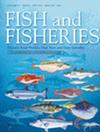The Need for Shifting Baselines to Guide Fisheries and Ocean Activities From Days to Decades
IF 6.1
1区 农林科学
Q1 FISHERIES
引用次数: 0
Abstract
With novel ocean conditions rapidly appearing as the result of climate change, basing decisions about fisheries and other ocean activities on historical conditions is no longer tenable. There is instead a widespread need for shifting ecological baselines to more effectively guide decisions into the future. What has not been as widely recognised is that the relevant timescales differ substantially across ocean‐related decisions, from lead times of hours to decades depending on the decision being made, and that this range necessitates a matching range of ecological forecast products across similar timescales. At the moment, a predictability gap exists at intermediate timescales, from multi‐annual to multi‐decadal forecasts. Because most fisheries and many other ocean activities rely on biological conditions like fish abundance or distribution, the ecological inertia of organismal growth, generational turnover, movement, and food web dynamics can help push ecological forecasts further across this gap. To realise this potential for more effective and usable ecological forecasts, coordinated research and implementation at the intersection of biology, climate science, social science, and decision‐making is needed. These efforts will be critical for forecasting shifting ecosystem baselines and sustaining fisheries, ocean ecosystems, and the ocean economy in the coming decades of rapid change.需要将指导渔业和海洋活动的基线从几天改为几十年
由于气候变化导致新的海洋条件迅速出现,根据历史条件来决定渔业和其他海洋活动已经站不住脚了。相反,人们普遍需要改变生态基线,以便更有效地指导未来的决策。尚未被广泛认识到的是,海洋相关决策的相关时间尺度差异很大,根据所做决策的不同,前置时间从几小时到几十年不等,而这一范围需要在类似时间尺度上匹配生态预报产品的范围。目前,在中间时间尺度上,从多年预报到多年预报存在可预测性差距。由于大多数渔业和许多其他海洋活动依赖于鱼类丰度或分布等生物条件,生物生长、代际更替、运动和食物网动态的生态惯性可以帮助推动生态预测进一步跨越这一差距。为了实现更有效和可用的生态预测的潜力,需要在生物学、气候科学、社会科学和决策的交叉领域进行协调的研究和实施。这些努力对于预测生态系统基线的变化以及在未来几十年的快速变化中维持渔业、海洋生态系统和海洋经济至关重要。
本文章由计算机程序翻译,如有差异,请以英文原文为准。
求助全文
约1分钟内获得全文
求助全文
来源期刊

Fish and Fisheries
农林科学-渔业
CiteScore
12.80
自引率
6.00%
发文量
83
期刊介绍:
Fish and Fisheries adopts a broad, interdisciplinary approach to the subject of fish biology and fisheries. It draws contributions in the form of major synoptic papers and syntheses or meta-analyses that lay out new approaches, re-examine existing findings, methods or theory, and discuss papers and commentaries from diverse areas. Focal areas include fish palaeontology, molecular biology and ecology, genetics, biochemistry, physiology, ecology, behaviour, evolutionary studies, conservation, assessment, population dynamics, mathematical modelling, ecosystem analysis and the social, economic and policy aspects of fisheries where they are grounded in a scientific approach. A paper in Fish and Fisheries must draw upon all key elements of the existing literature on a topic, normally have a broad geographic and/or taxonomic scope, and provide general points which make it compelling to a wide range of readers whatever their geographical location. So, in short, we aim to publish articles that make syntheses of old or synoptic, long-term or spatially widespread data, introduce or consolidate fresh concepts or theory, or, in the Ghoti section, briefly justify preliminary, new synoptic ideas. Please note that authors of submissions not meeting this mandate will be directed to the appropriate primary literature.
 求助内容:
求助内容: 应助结果提醒方式:
应助结果提醒方式:


